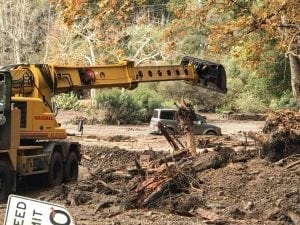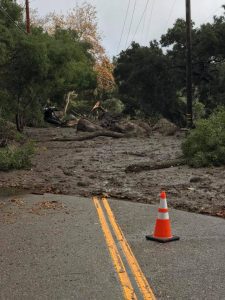
The Montecito mudslides killed at least 20 people. The destruction covered 30 square miles. (Photo courtesy Joost Bongaerts)
Floral industry members in Southern California are reeling from a devastating two-month period that’s included wildfires, storms and deadly mudslides.
Joost Bongaerts, owner of Florabundance in Carpinteria, California, said last week’s storm and mudslides were “like a tsunami coming down.”
“If you look at the map, there are all these creek beds around us,” he said. “Some were okay, others crested 4 or 5 feet. Some that were 20 feet wide became 100 feet wide.”
The Montecito mudslides killed at least 20 people. The destruction covered 30 square miles, leaving 65 single-family homes demolished and more than 450 others damaged. Nearly 30 commercial properties were damaged or destroyed.
Florabundance suffered no physical damage to it greenhouses — and all of the company’s employees are safe. In addition, Kasey Cronquist, PFCI, CEO of the California Cut Flower Commission, said he’s heard of only “minor damage to a couple of our 20-plus cut flower farms in Carpinteria Valley.”

Kasey Cronquist, PFCI, CEO of the California Cut Flower Commission, said he’s heard of only “minor damage to a couple of our 20-plus cut flower farms in Carpinteria Valley.” (Photo courtesy Joost Bongaerts)
“The storm has certainly left a mess and our farmers have been out working alongside first responders to move debris with their tractors and heavy equipment,” he said.
Based on reports Cronquist has received, all CCFC farmers, their families and their employees are safe.
As residents and businesses struggle to recover, they are facing new challenges, including a major road closure.
“Highway 101 is closed from Carpinteria to Santa Barbara, making pick up and deliveries extremely difficult,” Cronquist said. “However, farms are able to ship their flowers south to Oxnard for state and national distribution.”
At press time, state officials had not indicated when the highway would reopen.
Several of Bongaerts’ employees live in Santa Barbara, and the road closure has meant they can’t return to work.
“People can take the train, but it’s overcrowded,” said Bongaerts, who, like other growers, has continued to ship flowers nationally out of Oxnard.
Indeed, some industry members who evacuated last week have not yet been able to fully evaluate the damage. At press time, EBrief editors had reached out to, but not heard back from, several Society of American Florists members in the affected area.
Last week’s disaster came after deadly wildfires in the area. The fires had consumed vegetation, destroying root systems that stabilize soil. Additionally, ash created a waxy, water-resistant layer. When the rain came last week, it could not sink into the ground and ran down mountains and hills in massive mudslides instead.
Bongaerts voluntarily evacuated for nearly a week during the fires, which also forced the cancelation of Florabundance’s Design Days conference this month. It has been rescheduled for the same dates in 2019. Bongaerts described the decision as an “expensive headache,” but said people have been very supportive, many already registering for the event.
Still Bongaerts has a message for people worried about the California floral industry.
“We don’t need prayers or well wishes — we need people to buy flowers,” he said. “We have huge logistical challenges, but we’re still operational and eager to ship our flowers around the country. That’s how our friends in the industry can help. We will get through this.”
It’s a message Cronquist echoed.
“Our farmers are resilient,” he said. “Flower farming is a seven days a week business and the growing, cutting and shipping to our customers continues.”



